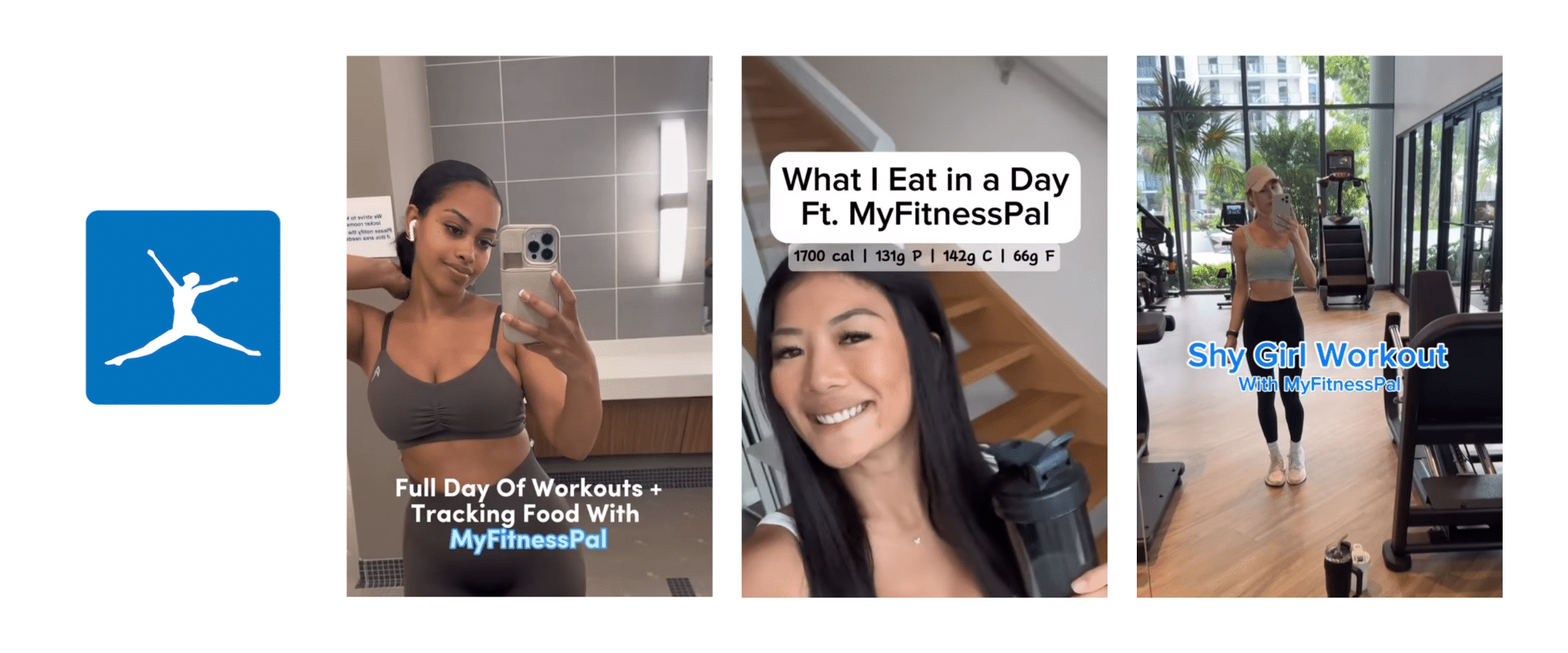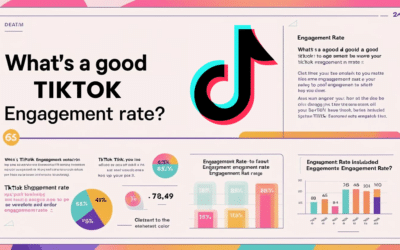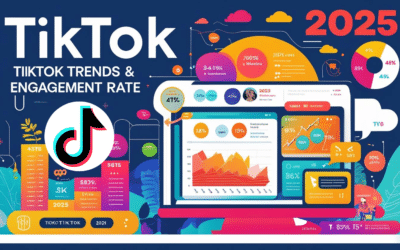Pros and cons of influencer marketing: Balancing risks and rewards
The pros and cons of influencer marketing: it’s a crucial topic for today’s digital-savvy businesses.
Influencer marketing is a key player in brand promotion and audience engagement.
But what really lies beneath the surface of those glossy Instagram posts and viral TikTok videos?
Is influencer marketing the golden ticket to brand success, or does it carry hidden pitfalls that businesses should be wary of?
At Click Analytic, we’ll dive deep into both the advantages and challenges of influencer marketing.
So, whether you’re a seasoned marketer or a curious entrepreneur, join us as we explore the pros and cons of influencer marketing.
What is influencer marketing?

Influencer marketing, at its core, is a fusion of old and new marketing tools.
It takes the idea of celebrity endorsement and places it into a modern-day, content-driven marketing campaign.
The main difference lies in the nature of the influencers.
👉 Unlike traditional celebrities, influencers can come from any walk of life.
They could be a well-known fashion blogger, a respected tech reviewer on YouTube, or a fitness guru on Instagram. What they share is a substantial and engaged group of followers, often in a specific niche.
Influencers provide a direct line to highly engaged, niche audiences that traditional media struggles to reach.
Their power lies in their authenticity and relatability – qualities that resonate with today’s consumers, who often value the word of a trusted influencer over corporate advertising.
👉 The explosion of social media platforms like Instagram, TikTok, and YouTube has only amplified the reach of influencers.
With algorithms favouring user-generated content and personal stories, influencers have become crucial in cutting through the digital noise to deliver brand messages more organically and believably.
Advantages and disadvantages of influencer marketing
Let’s explore the advantages and disadvantages of influencer marketing.
Pros of influencer marketing
Let’s start with the advantages of influencer marketing. These are some of the reasons why influencer marketing is a golden ticket to success.
👉 It expands brand reach and audience engagement
One of the most significant advantages of influencer marketing is its ability to broaden a brand’s reach and deepen audience engagement. This approach:
- leverages the influencer’s established follower base,
- enables brands to tap into new demographics and markets.
A compelling example is the collaboration between the fashion brand Daniel Wellington and a wide array of Instagram influencers.
Daniel Wellington’s strategy involved providing influencers with sleek, minimalist watches.
They allowed them to create and share content aligned with their personal aesthetic and audience interests. This approach showcased the product and did so in a way that felt authentic and unobtrusive.
The result?
🎯 A tremendous increase in brand visibility and engagement.
Daniel Wellington’s Instagram followers skyrocketed to over 4.6 million, and the brand became synonymous with affordable luxury and modern style.
👉 It builds trust and credibility

Another significant benefit of influencer marketing is its ability to build trust and credibility for a brand.
Influencers wield considerable power in shaping their audience’s perceptions and buying decisions.
A notable case study is the collaboration between Audible, Amazon’s audiobook service, and various influencers across platforms like YouTube and Instagram.
Audible strategically partnered with influencers known for their love of books and storytelling, such as podcasters and vloggers in the education and entertainment niches.
These influencers integrated Audible into their content organically, often discussing how they used the service to enjoy books amidst their busy lifestyles.
They shared personal anecdotes, favourite book recommendations, and special promo codes for their followers. This approach did more than advertise a product; it showed real-life applications of Audible, endorsed by trusted voices.
The impact?
🎯 A significant boost in Audible’s credibility as a service.
Followers of these influencers, seeing how Audible fit seamlessly into the lives of people they trust, were more inclined to view Audible as a credible, valuable service.
This strategy effectively capitalised on the influencers’ credibility to enhance the brand’s trustworthiness.
👉 Cost-effective and niche targets
Influencer marketing is cost-effective, especially compared to traditional marketing methods.
The key lies in its ability to precisely target niche audiences, ensuring that marketing efforts are widespread and strategically focused.
Traditional marketing, such as television or print ads, often requires a significant investment, with costs escalating based on reach and frequency.
While effective in their own right, these methods cast a wide net, sometimes failing to engage the specific demographics that a brand aims to reach.
In contrast, influencer marketing allows brands to collaborate with influencers whose followers align closely with their target audience.
This alignment means that every dollar spent is more likely to reach potential customers who are genuinely interested in the product or service.
For instance, a small cosmetics brand focusing on eco-friendly products can partner with influencers who advocate for sustainability and natural living.
These influencers typically have more influence on their audience than a traditional celebrity.
This precise targeting leads to more effective engagement and conversions, as the influencer’s followers are already inclined towards eco-friendly products.
It’s also good news for your budget.
Many influencers, especially those not at the celebrity level but with a dedicated niche following, offer more affordable collaboration rates.
This affordability makes influencer marketing particularly appealing for small and medium-sized enterprises (SMEs) that might not have the large marketing budgets of bigger corporations but still wish to reach relevant audiences effectively.
🎯 The cost-effectiveness of influencer marketing becomes even more pronounced considering the potential return on investment (ROI).
When done correctly, influencer marketing can yield substantial returns in terms of brand visibility, customer engagement, and sales conversions, often surpassing the returns from traditional advertising methods.
👉 Shortened sales cycles

A pivotal advantage of influencer marketing is its potential to shorten the sales cycle, swiftly moving consumers from awareness to decision-making.
This efficiency is primarily due to the trust and relatability that influencers have established with their audiences, making their endorsements particularly persuasive.
A striking example of this dynamic is the collaboration between the fitness app
MyFitnessPal and health-focused Instagram influencers. MyFitnessPal, an app designed for tracking diet and exercise, leveraged influencers to showcase their personal experiences using the app in their daily routines.
These influencers shared their fitness journeys, highlighting how the app simplified tracking their meals and workouts.
What made this approach effective was showcasing the app’s features and the personal, relatable stories that accompanied them.
Followers watching these influencers were informed about the app.
They saw it in action, integrated into a lifestyle similar to theirs. This real-world application, endorsed by someone they trust, significantly shortened the decision-making process.
🎯 Instead of going through a prolonged consideration cycle, potential customers were more quickly convinced of the app’s value, leading to faster conversions.
The influencer’s endorsement validated the app’s effectiveness, reducing the time and effort typically required by the consumer to research and decide on the product.
👉 Saves time

One of the less immediately apparent yet highly impactful benefits of influencer marketing is its significant time savings in content creation.
The constant need for fresh, engaging material can be daunting for many brands. This is where influencer marketing shines, offering an efficient solution.
Influencers are content creators at heart.
They have honed their skills in crafting posts, videos, and stories that resonate with their audiences. By collaborating with influencers, brands can tap into this expertise and creativity.
Instead of allocating extensive resources to brainstorm, design, and produce content internally, brands can leverage the content that influencers naturally produce.
A notable example is the collaboration between the travel company Airbnb, travel bloggers, and Instagrammers.
These influencers share their unique experiences staying in Airbnb properties around the world, capturing the essence of each location with stunning photography and engaging storytelling.
🎯 For Airbnb, this means a steady stream of authentic, high-quality content that showcases their offerings in various real-life contexts.
By utilising influencer-generated content, brands can maintain a dynamic and attractive online presence with less effort and investment.
This content, often seen as more genuine and relatable, can lead to higher engagement rates and a stronger online presence for the brand.
Cons of Influencer Marketing
Like most good things in life, influencer marketing has some disadvantages. Let’s discuss these cons of influencer marketing and how you can avoid them.
❌ Risks in brand-influencer alignment
While influencer marketing offers numerous benefits, it’s not without its risks.
One such risk is the potential misalignment between a brand and an influencer.
When an influencer’s values, message, or audience don’t align well with the brand’s, the collaboration can lead to negative outcomes instead of positive engagement.
An example of this was seen in a campaign by a luxury car brand that partnered with a young social media celebrity known for a lavish, party-centric lifestyle.
While the influencer had a large following, their image and content style clashed with the brand’s identity, which was built around sophistication and elegance.
The campaign received criticism for being inauthentic, and the disconnect between the influencer’s persona and the brand’s image led to a lacklustre response from both the influencer’s and the brand’s audiences.
⚠️ Our pro tip: To avoid such misalignments, brands must conduct thorough research on potential influencers.
This includes understanding the influencer’s audience demographics, values, content style, and how they resonate with the brand’s identity.
Brands should look beyond follower count and consider the influencer’s reputation, the nature of their previous collaborations, and the consistency of their messaging.
❌ Potential for brand reputation damage

The infamous Fyre Festival is a prime example of influencer marketing gone wrong.
Another concern in influencer marketing is the potential for damaging a brand’s reputation.
When influencer partnerships go awry, the consequences can extend beyond a failed campaign, potentially harming the brand’s long-term reputation.
A case in point is the infamous Fyre Festival, heavily promoted by many influencers and celebrities. Billed as a luxury music festival experience, the event relied on influencer marketing to build hype and sell tickets.
However, the festival disastrously failed to deliver on its promises, leading to widespread backlash.
The festival was criticised, and the influencers who promoted it faced scrutiny and distrust from their followers and the public.
The incident highlighted the risks associated with influencer marketing, especially when influencers endorse products or experiences without thorough vetting.
⚠️ Our pro tip: To mitigate such risks, brands must ensure due diligence in their influencer partnerships.
This involves researching the influencers’ alignment with the brand and verifying the authenticity of what is being promoted.
Transparency is key – both influencers and brands should be clear about what the partnership entails and the integrity of what is being promoted.
❌ Challenges in measuring ROI
Measuring the return on investment (ROI) is a critical aspect of any marketing strategy, but measuring ROI in influencer marketing presents unique challenges.
Unlike more traditional forms of advertising, where metrics such as reach, impressions, and direct sales can be more straightforwardly tracked, influencer marketing often involves more nuanced and indirect impacts that are harder to quantify.
One of the primary challenges is attributing conversions or sales directly to influencer activities.
While influencers can drive brand awareness and engagement, tracking the journey of individual consumers from an influencer’s post to a purchase can be complex.
Many factors contribute to a customer’s decision to buy a product, and isolating the influencer’s impact from other variables is not always straightforward.
Another difficulty lies in the qualitative nature of the benefits brought by influencer marketing, such as brand loyalty, customer trust, and long-term relationships.
These factors are crucial for a brand’s success but are not easily translated into immediate sales figures or quantifiable metrics.
⚠️ Our pro tip: To navigate these challenges, brands are increasingly turning to advanced influencer analytics tools and platforms to offer more sophisticated insights into influencer marketing performance.
By leveraging data analytics, brands can gain a more comprehensive view of their influencer campaigns, encompassing tangible and intangible benefits.
❌ Risks of influencer controversies
As public figures, influencers are constantly under scrutiny, and any scandal or controversy they become involved in can directly affect the brands they endorse.
Influencers’ controversies range from minor social media faux pas to major scandals.
When an influencer falls into disrepute, it can tarnish the reputation of any associated brands, sometimes long after the end of the partnership.
The immediacy and virality of social media mean that negative associations can spread rapidly, impacting consumer perceptions of the brand.
For example, a beauty brand faced backlash after one of its key influencers was involved in a high-profile social media feud.
Despite the brand’s previous success with influencer marketing, this controversy led to a significant public relations challenge, with consumers questioning the brand’s values and judgment in influencer selection.
⚠️ Our pro tip: To mitigate these risks, brands must exercise due diligence in choosing influencers.
This involves researching not only their current reputation but also their past behaviour and any potential red flags. Continuous monitoring of influencer activities and being proactive in managing partnerships are crucial.
Should you invest in influencer marketing?
Absolutely. While influencer marketing comes with challenges, its benefits outweigh its disadvantages.
The key lies in strategic planning before launching your influencer marketing campaign. Careful influencer selection and research can effectively mitigate the risks.
The advantages, such as unparalleled audience reach, authenticity, and cost-effectiveness, make influencer marketing a vital tool in the digital era.
It offers a level of engagement and trust that traditional marketing often cannot, making it an essential strategy for brands looking to thrive in today’s market.
Conclusion
Yes, there are pros and cons of influencer marketing. But, influencer marketing, when navigated wisely, offers immense benefits for brands.
Using an influencer analysis and marketing platform is the key to leveraging its full potential while minimising risks.
These tools help make informed decisions, ensuring that your influencer marketing strategy is effective and secure.
Embrace this approach, and you’re set to reap the rich rewards of influencer marketing with confidence.
Influencer Marketing Articles
Actionable tips to get more success with influencer marketing campaigns
What Is a Good TikTok Engagement Rate?
Discover what a good TikTok engagement rate looks like in 2025 and how to calculate and improve it using practical strategies and free tools like Click Analytic’s TikTok Engagement Rate Calculator.
TikTok Trends & Engagement Rate in 2025
Looking to boost your TikTok engagement rate in 2025? Discover current TikTok trends, average benchmarks, and proven strategies to grow your reach. Includes a free TikTok engagement rate calculator!
UGC TikTok Engagement Rate: How to Measure and Boost Performance
Want to increase your UGC TikTok engagement rate? Learn how to track performance, use authentic user content, and apply data-backed tips to grow your reach and engagement on TikTok.





